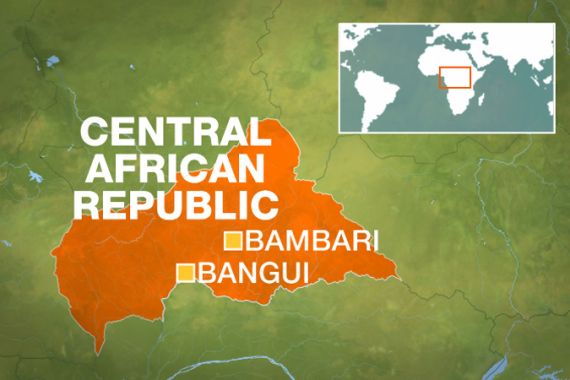French troops ‘arrive in Central Africa’
Troops and equipment airlifted to capital Bangui, where rebels belonging to coalition called Seleka took power in March.

French troops have started to deploy to the Central African Republic in preparation for an intervention to restore order, eight months after Seleka rebels ousted president Francois Bozize’s government.
Citing an aiport source, the AFP news agency reported on Thursday that the French military had airlifted men and equipment to Bangui, the capital of the former French colony.
“French military aircraft have made several round trips in the past few hours coming mainly from Gabon, to bring in supplies,” the source said, asking not to be named because of the sensitivity of the matter.
Jean-Yves Le Drian, France’s defence minister, on Tuesday announced plans to deploy 1,000 soldiers to help halt mounting violence in the country, where unprecendented religious clashes have aroused international fears of sectarian massacres.
France on Monday presented the UN Security Council with a draft resolution aimed at reinforcing a regional African military mission in the CAR (MISCA), with the goal of turning it into a UN peacekeeping force.
Gerard Araud, the French envoy to the UN, has said the resolution could be passed next week.
“Many patrol vehicles and troop transports, [including] light armoured vehicles, have arrived from Cameroon by road and headed directly for the M’poko military base,” which is MISCA headquarters near the capital, a Central African military source said.
“Ground reconnaissance missions and joint patrols are being carried out right now by teams of [French foreign] legionnaires and men from the 410-strong [French] force already located in Bangui,” the source added.
Prone to coups
The military intervention is the third in Africa by France since 2011 when its troops fought alongside those of the United Nations and President Alassane Ouattara, helping to oust Laurent Gbagbo who had put up stiff resistance and refused to step down after losing an election to Ouattara.
The most recent deployment was in January in northern Mali, where French troops battled armed groups who had seized large swathes of the country’s north to impose Sharia law. Both Mali and Ivory Coast, where France still has troops, are former French colonies.
The Central Africa Republic, a poor landlocked nation prone to coups, insurgencies, banditry and mutinies, plunged into chaos after a rebel coalition known as the Seleka (Alliance) ousted Bozize on March 24.
The rebels opened the way for Michel Djotodia, the de facto president, to become the first Muslim leader of the Christian majority nation. His accession to power was grudgingly acknowledged by other African leaders in exchange for a political transition to democracy.
Djotodia has offically disbanded the Seleka, but the motley crew of mostly Muslim fighters have taken to looting and burning villages, killing people who fail to flee, according to Human Rights Watch (HRW) and other rights groups.
In response, Christian populations have formed militia forces that attack Muslims, who are “often traders or nomads who have nothing to do with Seleka,” French researcher Roland Marchal said.